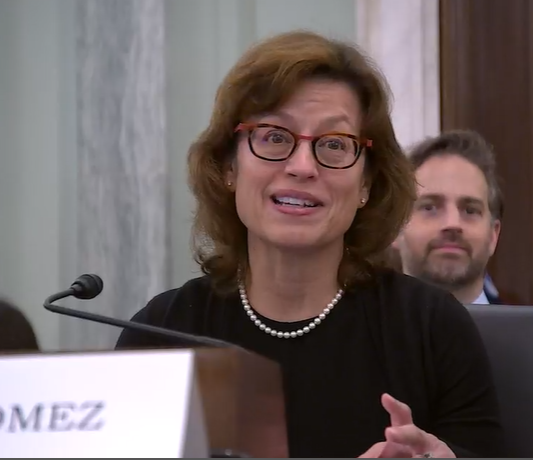WASHINGTON, D.C. — Despite widespread opposition from Senate Republicans, Anna Gomez is on her way to filling the long-vacant fifth seat on the Federal Communications Commission, thanks to a floor vote conducted Thursday in the upper body of Congress.
It was hardly a decisive victory for Gomez, with a voice vote yielding a final tally of 55 YES and 43 NO votes from the Senators as of 2:31pm Eastern. Notably, West Virginia Democrat Joe Manchin voted in favor of Gomez. Republican Mitch McConnell‘s “no” vote was among the last to come in.
The vote in favor of Gomez swiftly moves the former NTIA figure who in January became a Senior Advisor for International Information and Communications Policy at the U.S. State Department into a position to retroactively fill a seat that has been vacant from July 1, 2021.
Indeed, it has been 798 days that the FCC has been mired in a four-vote stalemate, as the Biden Administration unsuccessfully sought the confirmation — twice — of the controversial Gigi B. Sohn. With Sohn’s withdrawal as Biden’s FCC nominee, the White House moved forward with Gomez’s nomination — heeding suggestions by multicultural groups and Washington insiders that selecting Gomez was a good choice for the White House.
While that appears to be true among Democrats, Republicans ranging from Ted Cruz, Mario Rubio, Tommy Tuberville, John Thune and Rand Paul continue to cast doubt on the White House’s decisionmaking when it comes to the FCC.
Ahead of a contentious vote on a motion to invoke cloture on Gomez’s nomination, essentially ending all debate and setting up the floor vote on whether or not she deserves the FCC seat, Thune issued a statement announcing his opposition to Gomez.
Why? It has everything to do with the future of “net neutrality,” and the Title II classification for broadband in the U.S. “Since restoring the light-touch government regulation of the internet, mobile and fixed broadband access has expanded, Americans enjoy faster internet speeds, and 5G services have been expanded to more rural areas,” said Thune, who like nearly all Republicans oppose net neutrality as it was enacted under former FCC Chairman Tom Wheeler. “Unfortunately, Ms. Gomez would like to undo that progress by reinstating heavy-handed, Obama-era regulations to the internet, which would stifle our nation’s dynamic and robust e-commerce sector and slow down the expansion of broadband to rural communities. For that reason, I oppose her nomination.”
The opposition, however, was more of a political statement than roadblock for Gomez, who was suggested by Fletcher Heald & Hildreth attorney Francisco Montero at the 2022 Hispanic Radio Conference as a leading candidate of the Biden Administration should Sohn’s nomination fail.
The vote to limit debate on Gomez was 55-43.

FROM LAW CLERK TO THE STATE DEPARTMENT
“I have extensive experience in domestic and international communications law and policy,” she states on her LinkedIn page.
That experience began in 1991, when Gomez took a role as a Law Clerk for the summer at Arnold & Porter. It was a role she held for three years. In 1994, she joined the FCC’s Common Carrier Bureau, serving as Legal Counsel to the Chief for a two-year period.
From there, Gomez would serve as Deputy Chief of Staff in the Clinton Administration for the National Economic Council; that role came concurrent to a promotion at the Common Carrier Bureau to Chief of the Network Services Division.
After a year as senior legal advisor to Bill Kennard (2000-2001), Gomez would spend seven years as Deputy Chief of the FCC’s International Bureau.
In 2006, however, Gomez would exit and enter the private sector, taking a position as VP of Government Affairs for Sprint Nextel.
But, upon the election of Barack Obama as U.S. President, she returned to Washington politics, serving for three months on the U.S. Trade Representative Transition Team. In 2009, she joined the NTIA, serving as the Deputy Assistant Secretary until March 2013.
At that point, Gomez entered the private sector for a second time by joining Wiley, the law firm founded by former FCC Chairman Dick Wiley.
After nine years, Gomez “retired” in June 2022. But, that retirement would end in January with her role at the Department of State, serving as Senior Advisor for International Information and Communications Policy.
Now, she’s been given a clean path to the FCC.




